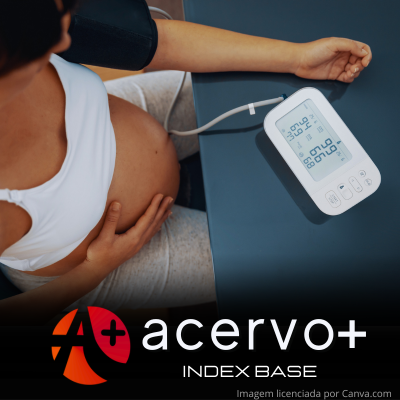Disbiose e desenvolvimento de pré-eclâmpsia e eclampsia
##plugins.themes.bootstrap3.article.main##
Resumo
Objetivo: Analisar a relação da disbiose dos microbiomas intestinal, vaginal e oral com o desenvolvimento de pré-eclâmpsia e eclâmpsia. Métodos: Esta revisão integrativa envolveu a busca de estudos nas bases de dados National Library of Medicine, Literatura Latino-Americana e do Caribe em Ciências da Saúde e Cochrane Library, onde foram encontrados quinze artigos acerca do tema, após selecionados os critérios de inclusão e exclusão. Resultados: Todos os artigos analisados são do tipo ensaio clínico. Dentre eles, treze avaliam o microbioma intestinal, um vaginal e um avalia concomitante os microbiomas intestinal, vaginal e oral. Considerações finais: Existem bactérias com ação protetora e outras com ação deletéria envolvidas no mecanismo da fisiopatologia da pré-eclâmpsia (PE). A barreira intestinal realizada pelas bactérias protetoras que produzem ácidos graxos de cadeia curta possui efeitos anti-inflamatórios e antioxidantes que podem prevenir a inflamação placentária e consequentemente o desenvolvimento da PE, e é por meio da investigação dos metabólitos produzidos por essas bactérias que será possível focar em alvos para prevenção e tratamento da doença.
##plugins.themes.bootstrap3.article.details##
Copyright © | Todos os direitos reservados.
A revista detém os direitos autorais exclusivos de publicação deste artigo nos termos da lei 9610/98.
Reprodução parcial
É livre o uso de partes do texto, figuras e questionário do artigo, sendo obrigatória a citação dos autores e revista.
Reprodução total
É expressamente proibida, devendo ser autorizada pela revista.
Referências
2. BENÍTEZ-GUERRERO T, et al. Gut Microbiota Associated with Gestational Health Conditions in a Sample of Mexican Women. Nutrients, 2022; 14: 4818.
3. CHEN X, et al. Gut dysbiosis induces the development of pre-eclampsia through bacterial translocation. Gut, 2020; 69: 513–522.
4. CHANG Y, et al. Short-chain fatty acids accompanying changes in the gut microbiome contribute to the development of hypertension in patients with preeclampsia. Clin Sci (Lond), 2020; 134(2): 289–302.
5. GELDENHUYS J, et al. Diversity of the gut, vaginal and oral microbiome among pregnant women in South Africa with and without pre-eclampsia. Front. Glob. Womens Health, 2022; 3: 810673.
6. GINJA FO. Microbioma e desfechos obstétricos adversos. Tese de Mestrado (Mestrado Integrado em Medicina - Área Científica de Fisiopatologia) - Faculdade de Medicina da Universidade de Coimbra, Portugal, 2021; 36.
7. HUANG L, et al. Gut microbiota changes in preeclampsia, abnormal placental growth and healthy pregnant women. BMC Microbiol, 2021; 21: 265.
8. LEVY M, et al. Dysbiosis and the immune system. Nature Reviews Immunology, 2017; 17(4): 219-232.
9. LV L-J, et al. Early-Onset Preeclampsia Is Associated With Gut Microbial Alterations in Antepartum and Postpartum Women. Front. Cell. Infect. Microbiol. 2019; 9: 224.
10. LV L-J, et al. Deep metagenomic characterization of gut microbial community and function in preeclampsia. Front. Cell. Infect. Microbiol. 2022; 12: 933523.
11. LI P, et al. Association between gut microbiota and preeclampsia-eclampsia: a two-sample Mendelian randomization study. BMC Med. 2022; 20: 443.
12. LIN CY, et al. Severe preeclampsia is associated with a higher relative abundance of Prevotella bivia in the vaginal microbiota. Sci Rep, 2020; 10: 18249.
13. MIAO T, et al. Decrease in abundance of bacteria of the genus Bifidobacterium in gut microbiota may be related to pre-eclampsia progression in women from East China. Food & Nutrition Research, 2021; 65.
14. MEIJER S, et al. Gut Micro- and Mycobiota in Preeclampsia: BacterialComposition Differences Suggest Role in Pathophysiology. Biomolecules, 2023; 13: 346.
15. PEIXOTO-FILHO FM, et al. Predição e prevenção da pré-eclâmpsia. Femina, 2023; 51(1): 6-13.
16. SILBERGELD EK. The microbiome: Modulator of pharmacological and toxicological exposures and responses. Toxicologic pathology, 2017; 45(1): 190-194.
17. WITKIN SS. The vaginal microbiome, vaginal anti-microbial defence mechanisms and the clinical challenge of reducing infection-related preterm birth. BJOG, 2015; 122: 213–219.
18. WANG J, et al. Gut Microbiota Dysbiosis and Increased Plasma LPS and TMAO Levels in Patients With Preeclampsia. Front. Cell. Infect. Microbiol. 2019; 9: 409.
19. WANG J, et al. Gut microbiota dysbiosis in preeclampsia patients in the second and third trimesters. Chinese medical jornal, 2020; 133(9): 1057–1065.
20. WU X, et al. Gut microbiota and hypertensive disorders in pregnancy: evidence from the Mendelian randomization study. Aging, 2023; 15(17): 9105–9127.
21. XIONG Z, et al. The causal role of intestinal microbiome in development of pre-eclampsia. Funct Integr Genomics, 2023; 23: 127.

